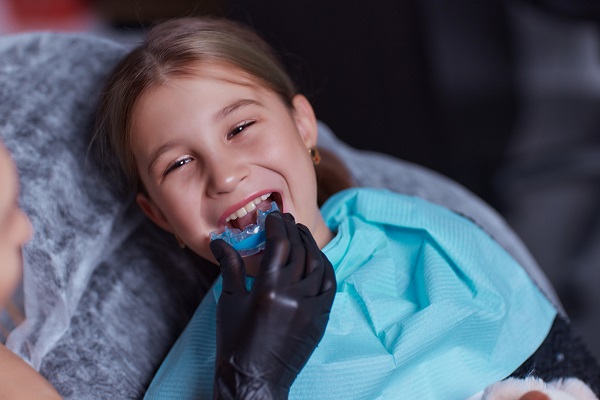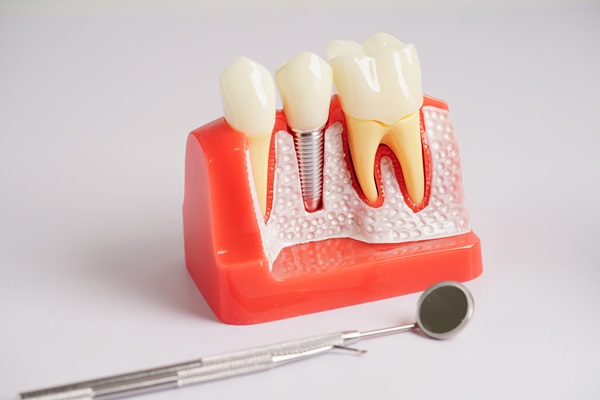Protect Your Child’s Teeth With Kids Mouthguards

Most parents protect their children's safety with helmets and other padding but often overlook the use of kids' mouthguards. This could wind up being a costly omission because mouth guards effectively reduce the risk of tooth loss. According to the American Academy of Pediatric Dentistry, the lifetime cost for tooth replacement ranges between $5,000 and $20,000.
What are mouthguards?
Mouthguards are protective equipment that fits into the mouth. They normally sit around the top teeth but protect the entire mouth by doing so. Since they take on a portion of any impact to the mouth, the user's teeth, jaw, and soft tissues are protected even though only the upper teeth are physically covered. The three types of mouthguards are described here.
Stock mouthguards
Stock mouthguards are pre-formed and assist in protecting the mouth, though they do not fit perfectly. This is because they are not formed to fit a particular mouth. The benefit of these kids' mouthguards is that they are the least expensive type, ranging from $3 to $25 each.
Boil and bite mouthguards
A boil and bite mouthguard comes in a solid form that is then boiled and bit by the child to create a customized fit. These are also relatively inexpensive, ranging in price from $15 to $50, and are more comfortable and effective than the stock mouthguards.
Custom mouthguards
Dental offices can make personalized pieces, known as custom mouthguards. These are typically more comfortable and provide more protection than the less expensive alternatives. The price is quite a bit steeper, at $200 to $350 per piece of equipment.
Proper care for kids mouthguards
The care of mouthguards for children is relatively simple and involves:
- Rinsing with water before and after use
- Removing retainers before wearing them
- Refraining from chewing on them
- Storing in a clean container with holes to allow proper drying
Potential sports-related mouth injuries
Oral injuries resulting from sports accidents can lead to painful and expensive dental procedures. Below is a description of common oral injuries resulting from sporting accidents.
Chipped or cracked teeth
A chipped tooth could necessitate a crown to fit over the tooth as a protective layer. This can be quite costly. Cracked and chipped teeth can lead to infections, which are painful and increase the likelihood of tooth decay.
Knocked-out teeth
A knocked-out tooth could result in total tooth loss. If your child experiences this, save the tooth and see your dentist immediately to try to repair it. This wound could cost you thousands of dollars to fix and cause considerable pain to your young child. In addition, damage to the two front teeth is a very common facial sports injury. This is a very painful and noticeable wound. Once a tooth is damaged, it leads to numerous dental procedures that can be ongoing throughout the patient's life.
Conclusion
Though kid's mouthguards are often overlooked, they can help you protect your child from serious injury. Consider adding one to your child's protective gear to be worn during football, hockey, or rugby.
We encourage you to contact our office to discuss your kid's mouth guard needs. Our team will guide you through the process.
Check out what others are saying about our dental services on Yelp: Kids' Mouthguard in Coronado, CA.
Recent Posts
Learning about your sleep apnea treatment is your next step after being diagnosed with this fairly common sleeping condition. According to Hopkins Medicine, it’s important to treat sleep apnea, because it can have long-term consequences for your health. Ready to find out more about why treating this condition is so important to your overall health?Want…
Choosing dental implants is a great idea if you are looking into your tooth-replacement options because you are missing one or more of your teeth. This option is one that offers benefits that other replacement options do not, which is why so many patients are choosing implants to replace their missing teeth. Other replacement options…
With the latest treatments in cosmetic dentistry, it is easy to have a white, bright smile. Everybody wants to have sparkling teeth, but it is difficult to achieve it without professional help. That is why teeth-whitening treatments are everywhere. If you are thinking about getting a cosmetic dentistry treatment to treat your stained teeth, here…
Dentures help some people regain their smiles without surgery. Breaking them in is important. It is the period of making your prosthesis a part of your life. Learning how to wear your dental prosthesis is important. If you want to find out how to maintain a secure and comfortable attachment for your dentures, here are…


